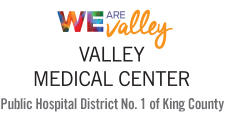Share your perspective and help improve the health of our community! Valley Medical Center is conducting a Community Health Needs Assessment (CHNA), a comprehensive report to help us better understand the health needs of the community our health system serves. Learn more and take the short survey.
Emotional & Mental Well-Being

Maintaining emotional and mental resilience is essential to our well-being. Below are some ways we can ensure emotional and mental resilience, followed by a select list of emotional and mental health resources.
- Get enough sleep: Go to bed and rise the same time each day.
- Exercise regularly: Preferably outdoors—even walking will do.
- Eat and drink healthy: Limit caffeine, alcohol and refined sugars.
- Limit smoking and drinking: Your body needs energy to survive sudden illness.
- Limit screen time: Reading or watching too much news or social media can increase anxiety.
- Relax and recharge: Giving yourself a break, from meditation to play, will decrease stress.
- Keep a routine: Structure helps minimize uncertainty about the future.
- Stay busy: Don’t allow too much time to dwell on present circumstances.
- Keep a gratitude journal: Thankfulness can change attitudes and perspectives.
- Practice altruism: Service to others informs positive mental and emotional health.
- Practice an art or spirituality: Absorbing into your creativity is rejuvenating.
- Set priorities: Without them, life can often feel overwhelming.
- Connect with others: Make time to schedule video and phone chats.
- Access reliable sources: Misinformation can breed anxiety and fear.
- Use your creativity: It can be a real source of vitality.
- Stay in touch: Don’t delay routine wellness checks with your physicians.
- Do something new every day: Novelty promotes vitality.
- Frequently do what you’re good at: This will promote a sense of control and competence in unpredictable circumstances.
- Develop rituals: Rituals help structure time and bridge transitions from one activity to another.
- Find a support group: Connecting with like minds mitigates loneliness.
- Seek professional help: VMC Primary Care; VMC Psychiatry & Counseling Clinic; Psychology Today; Open Path Collective.
Anxiety and Depression Association of America
Tips and strategies for minimizing pandemic-related anxiety from ADAA mental health professionals, as well as personal stories of triumph.
Warm Line: 877-500-WARM (877-500-9276)
For people living with emotional and mental health challenges.
National Alliance on Mental Illness (NAMI): 800-950-6264
Information addressing the intersection between COVID-19 and people affected by mental illness, their caregivers and loved ones.
National Suicide Prevention Lifeline: 800-273-8255 (Veterans, press “1” for Veterans Crisis Line); Lifeline Chat
Provides 24/7, free and confidential support for people in distress, prevention and crisis resources for you or your loved ones.
Crisis Connections: 866-427-4747
Connects people in physical, emotional and financial crisis to services.
SAMHSA Disaster Distress Helpline: 800-985-5990
Provides 24/7, 365-day-a-year crisis counseling and support to people experiencing emotional distress related to natural or human-caused disasters.
Crisis Text Line: Text HOME to 741741
Provides confidential text access from anywhere in the U.S. to a trained crisis counselor.
Teen Link: Call or text 866-833-6546
Teen volunteers are trained to listen to your mental health or social concerns and talk with you about whatever’s on your mind.
National Domestic Violence Hotline: 800-779-SAFE (7233)
Free, confidential, round-the-clock help in identifying abuse and planning for safety.
Love is Respect: 866-331-9474 (Text LOVEIS to 22522)
Supporting young people of all persuasions in cultivating healthy and safe relationships.
Washington State Coalition Against Domestic Violence: 800-799-7233
A clearinghouse of information for victims of domestic violence, including links to local programs in your area.
DAWN: 425-656-7867
The largest provider of comprehensive domestic abuse services in south King County, offering immediate refuge from violence and expert guidance to survivors.
King County Mental Health Services
King County provides publicly funded mental health services to low-income people in need.
Washington State Department of Financial Institutions
Comprehensive list of resources to help Washington residents minimize financial crises caused by the pandemic.
Washington State Food Assistance Resources
Resources for finding food in Washington.
Seattle and King County COVID-19 Emergency Food Resources
Interactive lists and maps of food resources in the greater Seattle area.
King County 2-1-1
2-1-1 Community Resources Online (CRO) is the most up-to-date and comprehensive database of health and human services available for all of Washington State.
American Psychiatric Association: Resources for Families
Resources designed to support the well-being of the family and its children.
American Academy of Child and Adolescent Psychiatry
An excellent and well organized source of information for the public and clinicians alike.
SAMHSA Support for Families
Resources for families coping with mental and substance use disorders.
Washington Department of Health Behavioral Health Impact Guide for Families and Children
Risk and support factors for families, parents, guardians and children.
Behavioral Health Toolbox for Families
Provides general information about common emotional responses of children, teens and families during disasters.
Comprehensive resources for adapting emotionally and mentally to the unique stresses of the pandemic.
- Washington State Coronavirus Response
- King County Public Health Community Resources
- Centers for Disease Control
- Mayo Clinic
- World Health Organization
- National Center for PTSD
- American Psychological Association
- American Psychiatric Association
These resources below are for national health service websites from Scotland and Australia, but the information shared is applicable to anyone.
Sixty-one tips on the experience of grief and how to help people through it.
The Healing Center is open virtually and has adapted its grief support services to meet safety requirements during the pandemic.
Gay City Seattle COVID-19 Resources
Multiple categories of resources, from housing to illness to meal giveaways and basic needs.
PFLAG Seattle
Offers online support groups.
Trevor Lifeline: 866-488-7386, or text START to 678-678
A stalwart in support of LGBTQ+ youth in crisis.
Ingersoll Gender Center
A database collection of organizations, support groups and more across Washington which provide resources and services to transgender and gender diverse people.
One Mind Psyberguide
Find the mental health app that best meets your needs.
COVID Coach
- Education about coping during the pandemic
- Tools for self-care and to improve emotional well-being
- Trackers to check your mood and measure your growth toward personal goals
- Graphs to visualize progress over time
Washington Listens: Call or text 833-681-0211.
Talk to someone directly about stress due to COVID-19.
Suicide Prevention Resource Center
A selection of web pages and information sheets on mental health and coping with the effects of COVID-19.
National PTSD Resource Center
Information and resources to support self-care, as well as strategies that can help with the stress, grief and anxiety that many people are feeling.
Center for the Study of Traumatic Stress
Fact sheets and other resources to support the health and well-being of communities impacted by COVID-19.
American Psychoanalytic Association
Includes information for parents and guardians.
SAMHSA Virtual Recovery Resource Guide
A list of resources that can be used to virtually support recovery from mental/substance use disorders.
Washington Recovery Helpline: 866-789-1511
Offers local treatment resources for substance abuse, problem gambling and mental health, as well as to other community services.
Shatterproof
Helps those struggling with addiction find the treatment they need.
Veterans Crisis Line: 800-273-8255, press “1”
Reach caring, qualified responders with the Department of Veterans Affairs.
Washington State Department of Veterans Affairs
The Washington State Department of Veterans Affairs helps connect veterans and their family members to the benefits and services they earned through their military service.
US Department of Veteran Affairs
A comprehensive resource for maintaining and enhancing your mental health and well-being during the pandemic.
VA Mobile Apps
Self-support at any time, anywhere. Apps address COVID-19, PTSD and other issues.

